 W
WAtanarjuat: The Fast Runner is a 2001 Canadian epic film directed by Inuit filmmaker Zacharias Kunuk and produced by his company Isuma Igloolik Productions. It was the first feature film ever to be written, directed and acted entirely in the Inuktitut language.
 W
WBrother Bear is a 2003 American animated musical comedy-drama film produced by Walt Disney Feature Animation and released by Walt Disney Pictures. It is the 44th Disney animated feature film. In the film, an Inuit boy named Kenai pursues a bear in revenge for a fight that he provoked in which his oldest brother Sitka is killed. He tracks down the bear and kills it, but the Spirits, incensed by this unnecessary death, change Kenai into a bear himself as punishment. In order to be human again, Kenai must travel to a mountain where the Northern lights touch the earth. On his way, Kenai is joined by a bear cub, and learns to see through another's eyes, feel through another's heart, and discovers the true meaning of brotherhood.
 W
WFrost is a Canadian short drama film, directed by Jeremy Ball and released in 2012. The film stars Emily Piggford as Naya, a young Inuit girl in the Canadian Arctic who makes a perilous discovery while hunting.
 W
WThe Grizzlies is a 2018 Canadian sports drama film, directed by Miranda de Pencier. Based on a true story, the film depicts a youth lacrosse team that was set up to help combat an onslaught of youth suicide in the community of Kugluktuk, Nunavut.
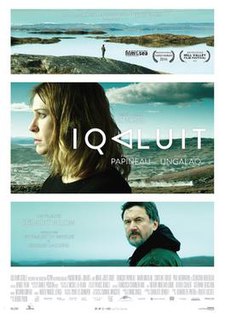 W
WIqaluit is a 2016 Canadian drama film directed and written by Benoît Pilon and starring Marie-Josée Croze, François Papineau and Natar Ungalaaq. The film was shot in Iqaluit, Nunavut, which provided its title. It is about a Quebec woman (Croze) who travels to Northern Canada after her husband (Papineau) is seriously injured. She uncovers the secret relationships he had with the Inuit community, and becomes acquainted with an Inuit man (Ungalaaq) struggling with a related family crisis.
 W
WThe Journals of Knud Rasmussen is a 2006 Canadian-Danish film about the pressures on traditional Inuit shamanistic beliefs as documented by Knud Rasmussen during his travels across the Canadian Arctic in the 1920s. Produced by Isuma, the film was directed by Zacharias Kunuk, who also directed the award-winning Inuit film Atanarjuat: The Fast Runner, and Norman Cohn. It premiered on September 7, 2006 at the Toronto International Film Festival, after pre-release screenings in Inuit communities in Canada and Greenland.
 W
WKabloonak is a Canadian drama film, directed by Claude Massot and released in 1994.
 W
WThe Legend of Sarila is a 2013 3-D computer-generated imagery (CGI) Canadian film and Canada's first 3-D animated feature film. The film draws heavily on Inuit culture and tradition. Set in northern Canada in 1910, it tells the story of three young Inuit, who set out for the legendary land of Sarila in search of food for their clan. One of them, Markussi, finds out during their adventures that he is really an Inuit shaman, while the clan's shaman at home repeatedly attempts to kill him and undermine their quest.
 W
WMaïna is a Canadian drama film, released in 2013. Directed by Michel Poulette, adaptation of Dominique Demers's novel, the film stars Roseanne Supernault.
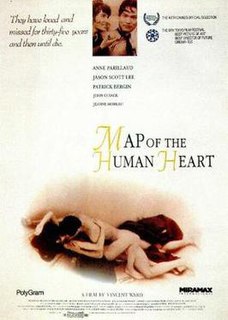 W
WMap of the Human Heart is a 1992 film by New Zealand director Vincent Ward. The script for Map of the Human Heart was written by Australian author Louis Nowra, using a 10-page treatment Ward had written a year earlier as his guide. Ward was originally intended at this time to be directing his script of the third film in the Alien series, but his dismissal from the sci fi project led to his helming this film instead.
 W
WNanook of the North is a 1922 American silent film which combines elements of documentary and docudrama, at a time when the concept of separating films into documentary and drama did not yet exist. In the tradition of what would later be called salvage ethnography, the film follows the struggles of the Inuk man named Nanook and his family in the Canadian Arctic. It is written and directed by Robert J. Flaherty, who also served as cinematographer, editor, and producer.
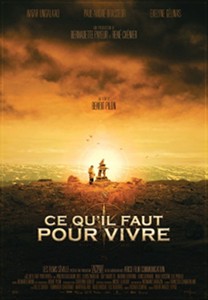 W
WThe Necessities of Life is a 2008 Canadian drama film directed by Benoît Pilon and starring Natar Ungalaaq, Éveline Gélinas and Paul-André Brasseur. Told in both French and Inuktitut, the film is about an Inuit man who is sent to Quebec for tuberculosis treatment.
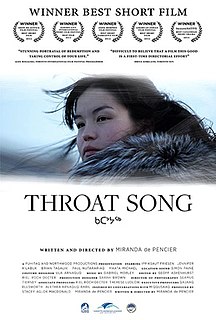 W
WThroat Song is a 2011 Canadian short drama film directed by Miranda de Pencier. The film stars Ippiksaut Friesen as Ippik, an Inuk woman in Nunavut who is trapped in an abusive relationship, and begins to heal her spirit and find her own voice after taking a job as a witness assistant for the government's justice department, aiding other victims of domestic violence.
 W
WTuktuq is a Canadian docufiction film from Quebec, directed by Robin Aubert and released in 2016. The film stars Aubert as Martin Brodeur, a cameraman who is sent to a small Inuit village in the Nunavik region of Quebec as part of a government project to film the community, but soon learns that the reason behind the project is that the residents are about to be forcibly displaced as part of a major new hydroelectricity development.
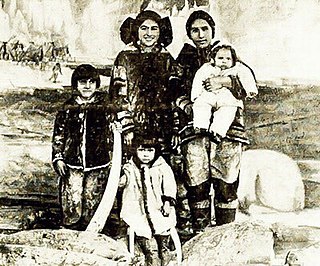 W
WThe Way of the Eskimo is a lost 1911 American silent drama film that portrayed the Inuit or "Eskimo" culture of northeastern Canada along the coast of Labrador. Directed by William V. Mong and produced by Selig Polyscope Company, this "photoplay" was based on a love story written by Columbia Eneutseak, a young Inuit woman who was born in the United States in 1893, in the "Esquimaux Village" exhibition at the World's Columbian Exposition in Chicago. She, fellow Inuit performer Zacharias Zad, and William Mong costarred in the film with a supporting cast that included members of Columbia's immediate family and other Inuit players. While this production was promoted in 1911 as being filmed on location in northern Canada, it was actually shot that year at the snow-covered port town of Escanaba, Michigan, along a frozen stretch of shoreline of Little Bay de Noc, which connects to Lake Michigan.
 W
WThe White Dawn is a 1974 Canadian-American film directed by Philip Kaufman and starring Warren Oates, Timothy Bottoms, and Louis Gossett, Jr. It portrays the conflict between aboriginal peoples' traditional way of life and Europeans' eagerness to take advantage of them. The film employs authentic Inuit language dialogue. It is based on the 1971 novel The White Dawn: An Eskimo Saga by James Archibald Houston, who co-wrote the screenplay.